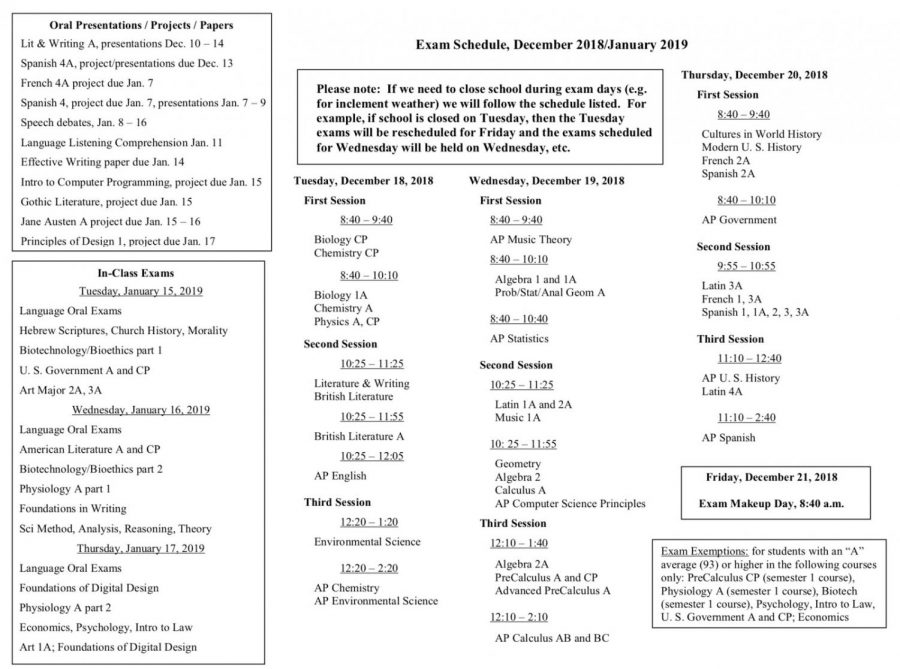How to Study for Midterms and Finals
As the busy, yet fun-filled, month of December is quickly rushing past us, the not-so-fun time of the year is unfortunately upon us: Midterms. While students run around buying gifts for friends, family, and Advent Angels, the added stress of Midterms looms overhead. Though many will become swept up by the excitement of the busy holiday approaching, some may be keeping their eye on the dreaded Midterms, which are scheduled for December 18th, 19th, and 20th. For you select few, I’m going to give some tips, tricks, and advice about studying for these unpleasant exams. However, the tips below are how I study best for cumulative exams, but everyone learns and remembers things differently. So, that leads me to my first piece of unofficial advice, which is: everything you are about to read is only my opinion and what works for me. I may study a completely different way than you do, and that’s totally fine. Studying is different for everyone, so you just have to:
Tip #1: Know yourself.
Before you begin studying, you must identify your strengths and weaknesses in learning. Think to yourself: what is the best way I remember things? Am I a visual, auditory, or hands-on learner? Do I learn from handwritten or typed notes? Can I remember things better by drawing out concept maps or making an outline? These are a few questions you should ask yourself whenever you study, but especially when studying for an exam that encompasses numerous topics. The key to any success is knowing your abilities and building off of them.
Tip #2: Make a plan.
Once the exam schedule is released, make a timeline for a study plan. This will keep you organized and help you stay on top of your studying. Space out your studying for each subject evenly so that it’s not overbearing. The sooner you make a plan, the more time you’ll have to study and review old concepts.
Tip #3: No phones. No distractions.
Once you sit down to study, dedicate that time solely to studying. Nothing else. Turn off your phone and leave it in another room. Your friends will always be there even if you answer a few hours later. If you keep your phone close to your study space, you will inevitably find yourself scrolling through Instagram or Snapchatting your friends. Don’t do it. Don’t give in to the temptation because the more time you are on your phone, the less time you spend reviewing.
Tip #4: Don’t procrastinate. Don’t cram.
This one is a biggie. However, if you follow Tips #2 and 3, you should be able to avoid this. Although it’s nice to lie on the couch or in your bed while watching Netflix, this is not a productive way to spend your time. Procrastination and cramming the night before simply adds unnecessary stress. Midterms are stressful enough, so don’t add more when it can easily be avoided. Instead, begin studying about a week before the Midterm so you have a sufficient amount of time to review the material. Don’t try to study all in one sitting. Take small 5-10 minute breaks once in a while. Following your daily study plan will alleviate some of the stress.
Tip #5: Sleep. Eat. More Sleep.
If you were unsuccessful at following Tip #4, you may find yourself cramming the night before your exam. If this is the case, it is imperative that you still allow yourself to get enough sleep. Pulling an all-nighter is not the ideal situation. Instead, one useful way to combat this issue is to set a cutoff time. If you are still studying when it’s a certain time, just go to sleep. (Disclaimer: cutoff times may vary.) I guarantee you that getting an hour more of sleep is more beneficial than staying up another hour, hoping to cram information into your tired brain. Adding some brain-boosting foods to your diet, such as blueberries, salmon, avocado, eggs, and dark chocolate, will enhance your memory and improve learning ability. And did I mention sleep?!
Tip #6: Relax.
Finally, be confident in yourself and your abilities. Although Midterms can cause lots of stress, try not to put too much pressure on yourself. Remember, you have already been tested on this material before. This is simply a review of previous concepts.
Hopefully you learned at least one new thing about studying for exams! And if you follow some of the above advice, it may be a little more work now, but after the 20th, you will have more than just Christmas to celebrate. Good luck to everyone with their upcoming Midterms!

